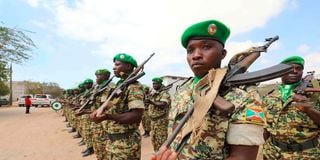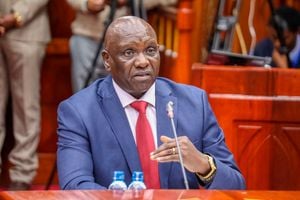Let stakeholders help in shaping Aussom’s strategy for a stable Somalia

Burundian African Union Mission in Somalia (Amisom) peacekeepers stand in formation at the Jaale Siad Military Academy.
What you need to know:
- Amisom initial mandate was to was to support the transitional government in Somalia.
- Amisom has also played a crucial role in securing the electoral process in Somalia.
On August 1, 2024, the African Union's Peace and Security Council made yet another significant decision at its 1225th meeting.
In this meeting, the body established the African Union Support and Stabilisation Mission in Somalia (Aussom), marking the latest chapter in the African Union's long-standing commitment to peace and stability in Somalia.
This mission follows the African Union Mission in Somalia (Amisom) and the African Union Transition Mission in Somalia (Atmis), representing the continued evolution of the AU's peacekeeping efforts in Somalia for the last 17 years.
Amisom was first established in 2007 as a peacekeeping mission authorised by the United Nations Security Council resolution 17444 with the deployment of African Union peacekeepers in Somalia on February 20, 2007.
Amisom’s immediate mandate was to support the transitional government in Somalia, which was at the time struggling to gain control over the capital amid the two-decade civil war that had been raging since the early 1990s.
The mission's initial mandate and first priority was to stabilise the country, assist in the establishment of government institutions, and provide humanitarian assistance.
Addressing challenge
Amisom operated in an extremely challenging environment, combating Al-Shabaab, which was at its peak and had taken control of large parts of southern and central Somalia.
Over the years, Amisom’s mandate was gradually expanded to include the provision of support for the implementation of a national security plan, building the capacity of Somali security forces, and creating necessary conditions for the delivery of humanitarian assistance. This mandate expansion was only after the recapture of key towns and cities across Somalia, gradually reducing the territory out of government hands.
Amisom has also played a crucial role in securing the electoral process in Somalia, it has greatly aided the establishment of the current federal government, spearheaded the constitution of several federal member states and helping restore a degree of stability in the country.
Amisom’s long-term presence in Somalia also highlighted the challenges of peacekeeping in a complex and volatile environment. The mission faced and still faces numerous obstacles; including limited resources, and a high level of casualties among peacekeepers.
As a result, a strategic decision was made to transition to a new mission that would focus more on empowering Somali institutions. The future of Aussom depends on building on past successes and addressing challenges.
Success depends on seamless transition of security responsibilities to Somali forces, sustained international funding and capacity-building support among others. Somali stakeholders should actively participate in shaping the mission’s strategy for long-term stability.
Fauziya Ali is the President of Women in International Security (WIIS) Horn of Africa (HoA). She is an expert in Governance, Gender and Human Security. She is on X (formerly Twitter)




